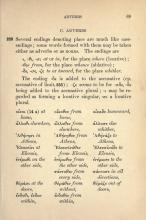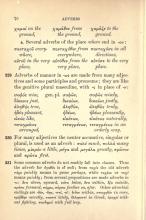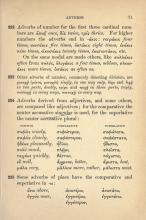228. Several endings denoting place are much like case-endings; some words formed with them may be taken either as adverbs or as nouns.
-ι, -θι, -σι (at or in) for the place where [locative]
-θεν (from) for the place whence [ablative]
-δε, -σε, -ζε (tο or toward) for the place whither
The ending -δε is added to the accusative (cp. accusative of limit, § 533); -ζε seems to be for -σδε, -δε being added to the accusative plural; -ι may be regarded as forming a locative singular, -σι a locative plural.
| οἴκοι (§ 14.a) at home |
οἴκοθεν from home |
οἴκαδε homeward |
| ἄλλοθι elsewhere |
ἄλλοθεν from elsewhere |
ἄλλοσε else-whither |
| Ἀθήνησι in Athens |
Ἀθήνηθεν from Athens |
Ἀθήνᾱζε to Athens |
| Ἐλευσῖνι at Eleusis |
Ἐλευσῑνόθεν from Eleusis |
Ἐλευσῖνάδε to Eleusis |
| ἑτέρωθι on the other side |
ἑτέρωθεν from the other side |
ἑτέρωσε to the οther side |
| πάντοθεν from every side |
πάντοσε in all directions |
|
| θύρᾱσι at the doors |
θύρᾱθεν from without |
θύρᾱζε& out οf doors |
| ἔνδοθι, ἔνδον within |
ἔνδοθεν from within |
|
| χαμαί on the ground |
χαμᾶθεν from the ground |
χαμᾶζε to the grοund |
a. Several adverbs of the place where end in -ου.
| πανταχοῦ everywhere |
πανταχόθεν from everywhere |
πανταχόσε in all directions |
| αὐτοῦ in the very place |
αὐτόθεν from the very place |
αὐτόσε to the very place |
229. Adverbs of manner in -ως are made from many adjectives and some participles and pronouns; they are like the genitive plural masculine, with -ς in place of -ν.
| Gen. Pl. | Adverb | |
| σοφός wise |
σοφῶν | σοφῶς wisely |
| δίκαιος just |
δικαίων | δικαίως justly |
| ἀληθής true |
ἀληθῶν | ἀληθῶς truly |
| ἡδύς pleasant |
ἡδέων | ἡδέως pleasantly |
| εἰκώς like |
εἰκότων | εἰκότως naturally |
| τεταγμένος arranged |
τεταγμένων | τεταγμένως in an orderly way |
230. For many adjectives the neuter accusative, singular or plural, is used as an adverb.
πολύ much
πολλά many times
μῑκρόν a little
μέγα and μεγάλα greatly
πρῶτον and πρῶτα first
231. Some common adverbs do not readily fall into classes. Thus the adverb for ἀγαθός is εὖ (well); from ταχύς the old adverb τάχα (quickly) means in prose perhaps, while ταχέως or ταχύ means quickly. From several prepositions are made adverbs in -ω.
ἄνω above, upward
κάτω below
ἔσω within
ἔξω outside
πρόσω forward
πόρρω, πόρσω farther on, afar
Other adverbial endings are -δόν, -δην, -στί, -εί.
ἔνδον within
στοιχηδόν in rοws
κρύβδην secretly
νεωστί lately
ἔλληνιστί in Greek
ἀμαχεί without fighting
πανδημεί with full levy
232. Adverbs of number for the first three cardinal numbers are ἄπαξ (once), δίς (twice), τρίς (thrice). For higher numbers the adverbs end in -άκις.
τετράκις four times
πεντάκις five times
ὀκτάκις eight times
ἐνάκις nine times
εἰκοσάκις twenty times
ἑκατοντάκις etc.
On the same model are made others, like πολλάκις (often) from πολύς, ὀλιγάκις (a few times, seldom), πλεονἀκις (more times), ὁσάκις (as often as).
233. Other adverbs of number, commonly denoting division, are:
μοναχῇ (μόνος, μοναχός) singly, in one way only
δίχα and διχῇ in two parts, doubly
τρίχα and τριχῇ in three parts, triply
πολλαχῇ in many ways
πανταχῇ in every way
234. Adverbs derived from adjectives, and some others, are compared like adjectives; for the comparative the neuter accusative singular is used, for the superlative the neuter accusative plural.
235. Some adverbs of place have the comparative and superlative in -ω.



